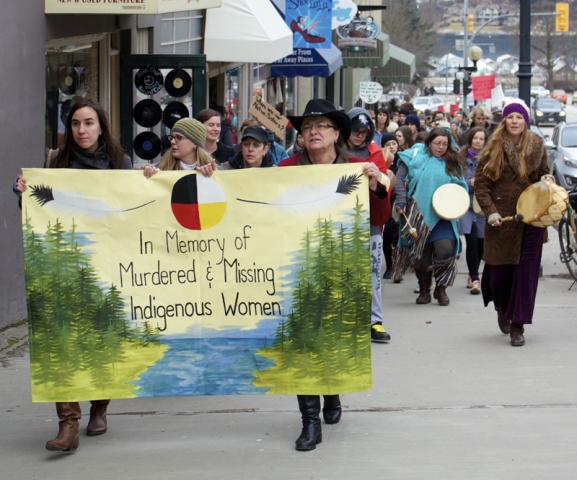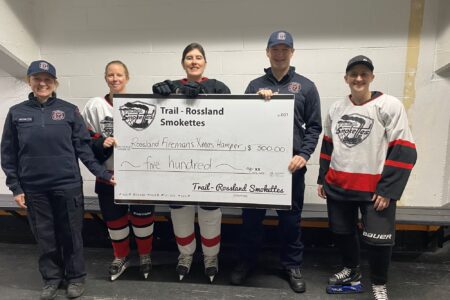Crowds Show Their Support For Missing & Murdered Women Memorial March
by Eva Brownstein, The Nelson Daily
A large crowd gathered Saturday outside the Nelson City Hall to honor and bring awareness to the 1,200 aboriginal women nationwide who have been murdered or are missing.
Waving banners reading, “No More Stolen Sisters” the crowd marched Baker Street holding a knotted rope, which organizer Leah Lychowyd said represented “that every life is sacred and that we need to hold each other up”.
The memorial march began nearly 25 years ago in the Downtown Eastside of Vancouver, where the first Coast Salish woman was abducted and murdered on Valentines Day, 1991.
Since then, the march has spread to 25 cities across Canada and the USA, with the Nelson chapter now in it’s second year.
We noticed there was a gap in Nelson”, said Lychowyd, who is a program coordinator at the Nelson Women’s Center, “we needed to recognize this important event.”
Local Nelson/Creston MLA Michelle Mungall joined the circle to express how politicians across Canada are making a national investigation a priority.
“Just because Stephen Harper says it’s not a priority for him, it’s a priority for hundreds of MP’s across Canada and their going to continue to work with First Nations to get that inquiry so we can move forward and start with solutions”.
One solution Mungall offered was a public bus service along the Highway of Tears, an isolated stretch of Highway 16 between Prince George and Prince Rupert where over 40 young aboriginal women have been murdered or disappeared.
“It would be so much simpler, safer, to have a bus along Highway 16 instead of billboards warning people not to hitchhike,” said Mungall.
“These women hitchhike because they have to, they have no other means to buy groceries, to get to a doctor’s appointment. A bus could solve the problem.”
While a bus service would protect vulnerable women along the Highway of Tears, many argue that the issue is one of systemic racism, and that the rising number of missing and murdered aboriginal women in Canada constitutes a cultural genocide.
“Part of the problem with violence against aboriginal women is that it’s something that isn’t visible”, said Lychowyd.
“It’s really important to bring this issue to the forefront and say no, these are our sisters and this is something that we need to bring out into the light.”
Many community members shared stories of hope and frustration, songs, and tears as the emotional march came to a close today in front of Nelson City Hall.
“It’s a place for emotion to be shared in a public space,” said co-organizer Sarah Miles. “It’s a safe space to grieve and through that grief find hope in moving forward.”
























